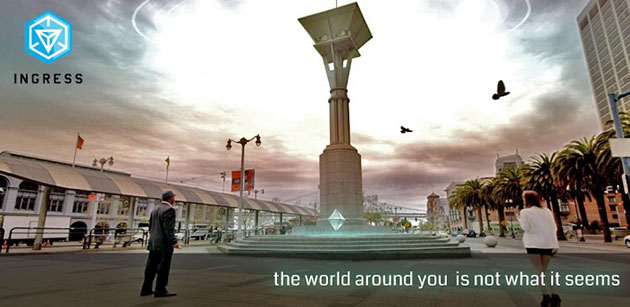
Last week, Google launched Ingress, a mobile augmented reality game that depends heavily on your Android phone’s location and imaging capabilities.
In the game, there are two groups of people vying for dominance, and you have to pick a side and commit yourself to its cause. Then, you’ll have to walk around your city collecting “exotic material” (XM), which lets you “hack” into “portals”. According the help page, “portals manifest themselves usually as public art such as statues and monuments, unique architecture, outdoor murals, historic buildings, and unique local businesses.”
Your Android phone will track your walking paths, and adjust the amount of XMs you can pick up accordingly. More XMs will appear on paths that you walk on less often, and less XM on your most frequent routes. In this way, Ingress encourages you to explore the city and visit places you haven’t really been to.
A companion website called the Niantic Project helps you keep track of the narrative, and allows new players to jump in easily no matter which stage of the narrative the game is currently at.
At first, I thought it was a pretty cool game, and it was laudable of Google to use its resources to try to push augmented reality gaming, an area of gaming which hasn’t really taken off. The game and story seems well-designed, and have gotten geeks and sci-fi fans all over the world excited. But the more I learn about the game, the more I’m certain that Ingress is a lot more than just a game.
Google is a company driven by data, and it’s no stranger to coming up with unapparent ways to let users gather its data, including turning the process into a game.
Back in 2006, Google licensed a game from Luis von Ahn, associate professor of computer science at Carnegie Mellon University, to crowdsource tagging of images to make them searchable. The ESP game — which you can still play here — showed two players an identical image, and asked them to input a word that describes an image. If the two players land on the same word, the word is then saved as a tag to help improve Google search.
Instead of hiring an army of data entry workers to stare at images all day and input relevant tags, the game turned tagging into something fun, voluntary, and best of all, came with minimal cost to Google.
Another example of a “free service” which ultimately helps Google is something which I’m sure we encounter almost daily on the Internet: the reCAPTCHA (also created by von Ahn). Google is digitising a lot of books, and the optical character recognition used to turn scanned pages into searchable text doesn’t always work. These scanned pages sometimes look like the mumbo jumbo we have to type into web forms to tell them we’re not robots. Combine the two and you get a very efficient crowdourced system of transforming scanned images into accurate text.
So let’s go back to Ingress. How does the game help Google?
The game is firstly very serious about knowing where you are. You cannot play the game if your phone cannot establish a GPS or WiFi connection. This means you’re being tracked every second you’re playing Ingress.
Also, Ingress would really like you to go to places you won’t usually go to by rewarding you with more XM on paths you tread less.
Put the two together, and it’s quite obvious Google is using you to help it build a database of walking directions from one point-of-interest to another.
This is important because existing walking directions on Google Maps actually gets you to walk along main roads instead of possibly more convenient pedestrian pathways. Through Ingress, Google can learn about unmapped walking routes, such as through parks or underpasses, and provide better walking directions in the future.
But Google wouldn’t want you to walk around aimlessly, and this is where the portals come in. As defined earlier, these portals are public points of interests, in other words, places where you would search for in Google Maps to find out how to get to. Ingress very likely maps your entire journey from your location to any given portal, thus giving it more information on finding the best walking route.
But what if you live in what Google calls “uncharted territory: areas of the world where Ingression has yet to be mapped”? Honestly, I think they might be even happier, because then you can submit photos of places where you think there should be portals, and moderators will determine if your submission is worthy. If your submission is accurate and unique, it will appear on the Ingress map as a new portal, i.e. a new point of interest which can be mapped.
Obviously, Google wants you to keep playing so its database can keep growing, and it accomplishes this by pitting your team against another team to fight for the control of portals. To keep hacking portals, you need more XM, and to get more XM, you need to keep walking, preferably down paths you don’t walk as often.
And who knows what else the app is reporting to its masters back at Google as you walk around your city with the app running?
This is utter genius. If the game goes global, Google will essentially be enlisting the help of millions and millions of people to improve its location services. It gets to know all about pedestrian behaviour without having to pay its users a single cent for their help. Plus, such a location-aware platform is a tremendous opportunity for many other things, such as targeted advertising and other brand tie-ups, or crowdsourcing geo-tagged photos for Google search, to name a few.
So what’s your take? Is Ingress just an innocent mobile game, or is there more to this than meets the eye?







there’s always more, anytime Google crams their fingers into something
It says so in the game itself- “this is not just a game.”
Google is the new Skynet
I suspect the portal submissions are more important than the paths, for two reasons: (1) It is possible to use Ingress in a car, and (2) it is possible to turn Ingress off and on, and Ingress provides no data to Google when it is turned off.
Hey dude – you’re welcome:
http://www.reddit.com/r/Android/comments/138res/google_launches_ingress_a_worldwide_mobile/c71v7yv?context=2
A mention might have been nice, however. :-/
Hey Shaper, thanks for sharing the link! But I promise I’ve never seen it before until now, and it reads like some other users in the thread thought of the same idea too. In fact, your analysis actually had some more insight than mine, such as bringing in the threat of Nokia Maps. Cheers.
Wow! Ingress it’s than a auto-Ypcress (remember film?). The reality mix with cyberpunk augment can to be the cause of confusion -Rabbit effect – so whosoever can to kill doing right. But it’is an soft-sweet to instigate s.o.to crime. Thanks Google!
Augmented reality + gaming = awesome way of changing the way the world works.
Really cool, and potentially really useful, if not used for evil (as always!)